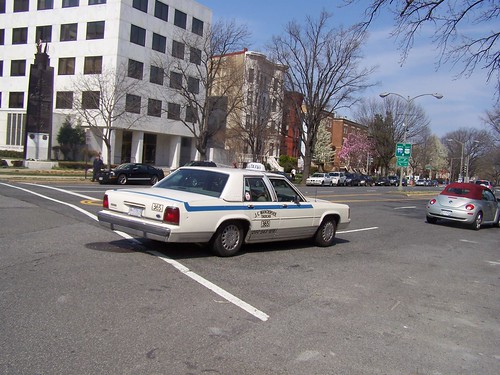Taxi medallions as a grant of wealth
The Washington Business Journal ran a piece, "Bill would completely overhaul D.C. cab industry," about legislation put forward by Councilmembers Graham, Thomas, and M. Brown to create a system of taxi medallions in DC.
This is a really bad move and hopefully, it will not be passed into law.
The current system merely requires a taxi license for the driver ($125/year) and a license for the taxi business ($475). And most importantly, there isn't an artificial limit set on the number of licenses and vehicles that can be operated.
Now, this creates some problems because there are probably more licensed taxis in the city than can be maintained in an economically viable fashion, and that is despite the fact that outlying areas of the city suffer from inadequate taxi service. In theory, if you have a quality vehicle, get it painted, get a business license, etc., and set up the business, which will cost some money sure, you can get into the taxi business for $475, plus an annual license fee.
NYC and other places have restrictions on the number of licenses that can be issued. Therefore, a "medallion" is treated as a form of privately owned property and becomes quite valuable and is a high-priced asset that is sold for a great deal of money. See "Driver competition hot as NYC taxi medallions hit $766000" from USA Today.
But it is not the city that makes the money from medallion sales, it is the "owner" of the license--and in reality this license is a privilege (not a right) granted by government.
Basically, the law as proposed restricts the number of licenses to 4,000, and it would convert the license from something that is a privilege to a saleable asset. And the winner of the value from this asset would not be the City (and the citizens), but the recipients of the licenses.
This bill is designed to produce wealth out of thin air for the taxicab industry and is a form of political entrepreneurialism--business which benefits from political decisionmaking--that should not be supported.
Sam Staley of the Reason Foundation wrote an op-ed about this which appeared in yesterday's Post, "What cab medallions would cost D.C."
This by the way is yet another example of the City Council trying to legislate transportation policy rather than encouraging the creation of a master transportation plan, which to my way of thinking, ought to include taxi policy as an element. Although again, it is more about making taxicab company owners extra-wealthy, than it is about anything for DC Government or DC residents.
Labels: bad government, electoral politics and influence, government oversight, taxi and jitney services, transportation planning




0 Comments:
Post a Comment
<< Home